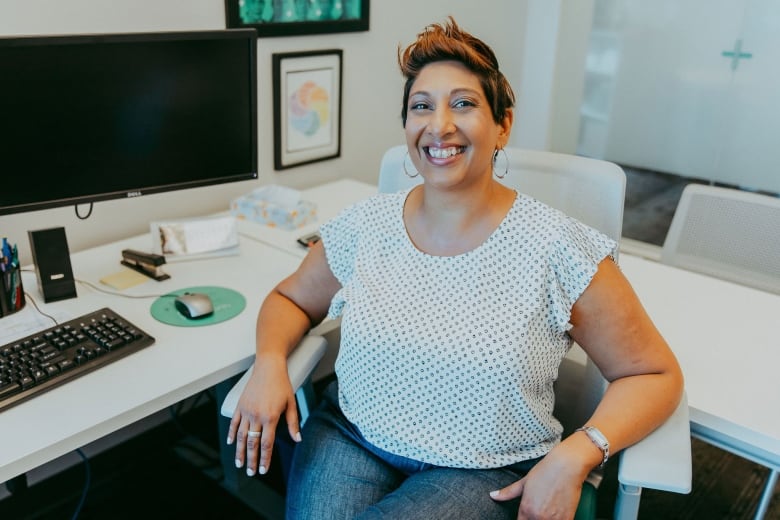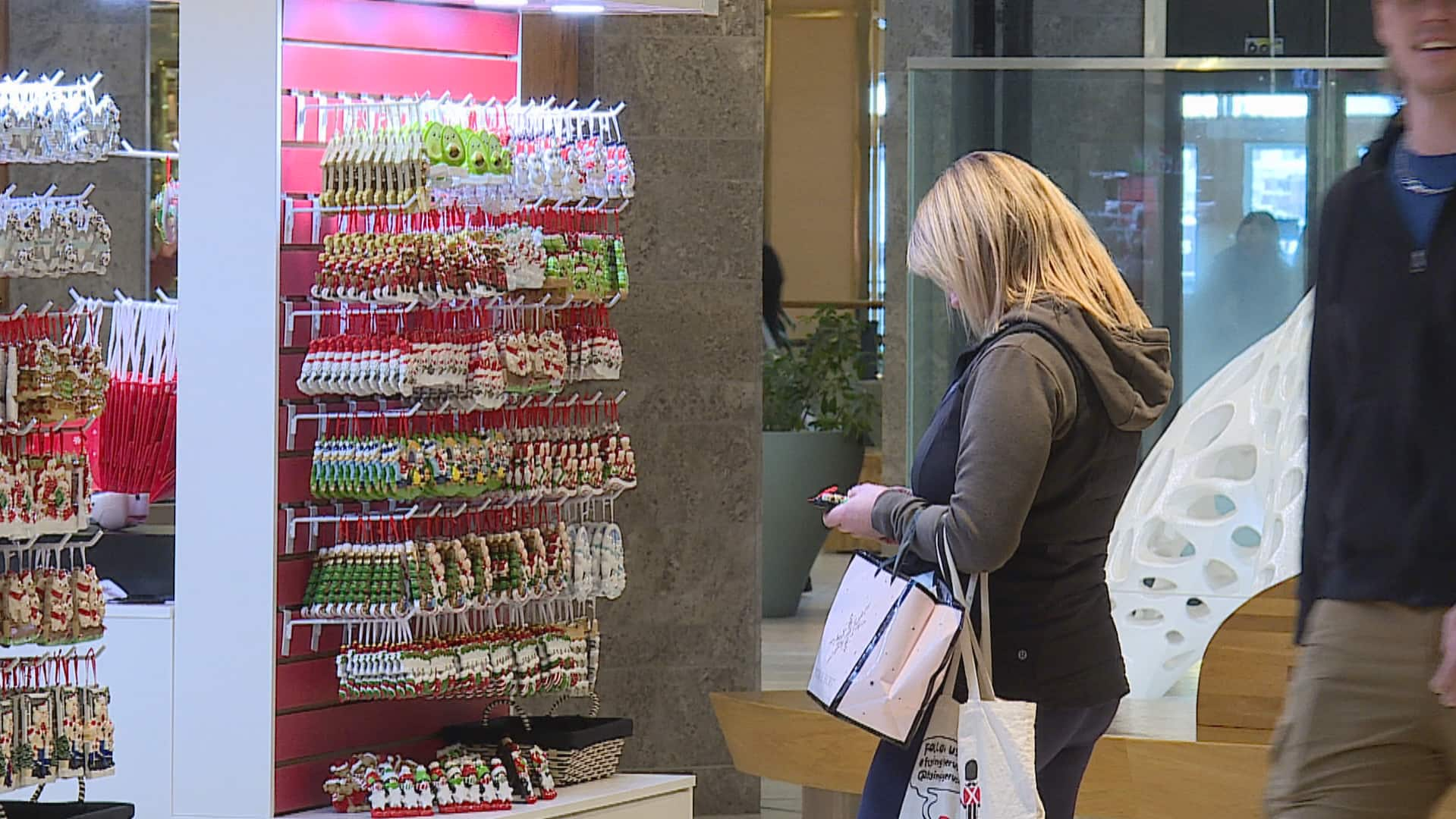
1:53:00FULL EPISODE: How are you dealing with high prices in the lead-up to gift-giving season?
Aside from recent lockdowns, this holiday season will mark the first time in Davis Gallagher’s life he won’t be spending Christmas with family, and he’s blaming Canada’s current economic climate.
Despite it being one of his favourite times of the year, the 24-year-old is skipping Christmas.
Gallagher, who lives and works as a mover in Montreal, says his job doesn’t pay enough to justify the added expenses that come with the holidays, while high costs make it virtually impossible to keep up.
“I don’t want you to think I’m some sort of scrooge,” he said. “I just can’t afford it with the skyrocketing price of gas, rent, groceries, and everything. I just don’t make enough money to be able to spend money on gas this year. I live paycheque to paycheque.”
As the end of 2022 draws near for Canadians, it doesn’t appear as if high prices and inflation are going away anytime soon. The 2023 Food Price Report predicts a typical family will see its food bill climb over $1,000 next year. Last week, the Bank of Canada raised its key interest rate for the seventh time this year in the fight against inflation — now sitting at 4.25 per cent, its highest point since 2008.
Even the price of Christmas trees is up this year, to the tune of 10 per cent, amid a nationwide shortage and higher farming and fuel costs. And the number of Canadians who rely on charities will grow to 22 per cent in the coming months, due to the rising cost of living, according to a recent Ipsos survey.

‘Puts a damper on your spirits’
Gallagher’s parents and sister live in the Ottawa-area. He says it was difficult to tell them he was skipping the holidays and not coming home, but thankful they didn’t give him much grief because of his financial situation.
“I had to call them and say, ‘look, I love Christmas, I love coming home, but I can’t afford to take the time off work, and pay for gas to come home and see everyone, let alone spend a bunch of money on gifts. I love you all, but it’s just not going to happen.'”
The decision to skip Christmas has been what Gallagher calls a “painful reminder” of how hard of a year it’s been for him, and what he’s going to miss — including his dog and cats back home, and the annual Christmas Eve taco night tradition with family.
“It’s always been something that’s brought joy into my life. It really puts a damper on your spirits,” he said.
WATCH | How some shoppers are changing their habits this season:
Inflation and the rising cost of living will have an impact on the holiday season — and some shoppers in Calgary are changing their habits while looking for gifts. The CBC’s Tom Ross reports.
Kelly Bos says making large financial or social decisions, like Gallagher has done, can be stressful and compounded during the holiday season.
The Gravenhurst, Ont., psychotherapist encourages people who are struggling to reach out for help — adding “recession” is a word that keeps coming up in her client conversations, and it’s making them feel anxious.
“I think a lot of people are scaling down,” said Bos. “I feel like it’s a tough one because we’re sort of coming out of restrictions socially or event-wise. So, there’s a lot of temptation to kind of jump in. But I think there’s hesitation.”
At this time of year, Bos says people are busy and can be distracted, leaving others on their own without much support. She encourages people to check in on each other.
“It might be someone you don’t even know very well. Maybe a neighbour. You might notice they’re on their own this year. Or a coworker. Extend yourself in some way. Be meaningful,” she said.
Be your own subtle scrooge
Taz Rajan, who helps people manage their debt as a community engagement partner with Canadian firm Bromwich and Smith, gives Gallagher kudos for saying no to Christmas, and no to going into debt to pay for it.
As for finding that delicate balance of saying no to some things while still enjoying the festive season, Rajan says one of the most important things to do is stay within your budget and be honest about it.
“In an ideal world you’re not having to be left out. In an ideal world you can say to someone who’s invited you home, and it’s a potluck, that it’s just not really in your budget to bring a potluck item,” she said, adding that you could instead offer to contribute by doing the dishes.
People should avoid trying to keep up with the Joneses during the holidays, she said, and give themselves the gift of not going further into debt to start 2023.

Paul Berton doesn’t think Canada’s high inflation and cost of living are changing the way people spend.
The journalist and author of Shopomania believes people have always gone overboard at Christmastime and always will.
“They just sort of face the music — credit card bills in January,” said Berton. “I suppose it tempers things slightly because we can only afford so much, but I don’t think inflation really plays that big of a role. Maybe it does when we’re shopping for ourselves, but when we’re shopping for others and we need a gift, we tend to lose.”
Berton says Canadians, for the most part, are buying too much, acquiring too much and need to consider things like food or beverages, conversations, babysitting or non-tactile things when it comes to gift giving.
“I believe that we’re buying too much because that is what’s expected of us. And that’s what we’re told by others: tradition and advertising.”
Christmas shopping in July
As a mother of two young boys, who both have December birthdays, Elizabeth Ioannou says she attacks her Christmas shopping in June and July.
The Toronto teacher, who’s currently on maternity leave, has built price matching into her normal day-to-day routine. She uses flyers and online price checking.
“I have a budget for everybody who I shop for,” said Ioannou. “I’m cost conscious, and find that the bills are more palatable when you’re spreading your Christmas shopping over from July to December versus feeling the crunch of it all within one month.”

Ioannou says she started buying early about 15 years ago to avoid the anxiety of the holiday season crunch.
“Black Friday, Cyber Monday is kind of my cutoff. Any last-minute things, I’ll look for the deal on the weekend and it’s basically do or die. I really try to get the majority of my stuff done by the end of September.”
Ioannou says the majority of her family is now grown with kids so they don’t get gifts for the adults anymore at Christmas.
“We buy just for the immediate family. We’re not necessarily buying for cousins and aunts and uncles. Even my husband and I — when we need things done around the house, we get them done, but we’re not buying gifts for each other.”
With files from Pete Evans, Stephanie Hogan and Patrick Swadden.
